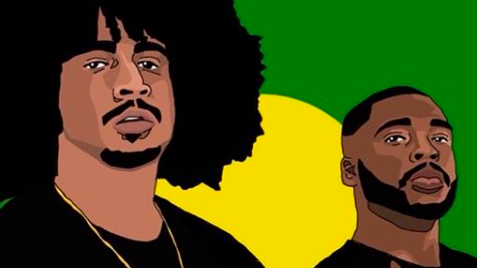If anyone is 'bout that action, It’s Blake Simons and Delency Parham of Hella Black Podcast.
The hosts met in 2015 during a student protest at UC Berkeley, where Simons was involved in the Black Student Union, and Parham was working as a news reporter for Berkeleyside.com. Since then, the two have worked together to create their own grassroots organization dedicated to addressing the housing crisis in Oakland, California.
Recorded and produced in Oakland, California, the podcast — which launched in 2015 — has been offering insightful commentary on the important social and political topics of today, covering a wide range of topics from anti-fatness to transphobia to classism.
Source: Soundcloud via Hella Black | "EP 59: Lizzo and Anti-Fatness (Feat @BlackFatQueer)"
The podcast is designed to insight meaningful conversations about the political empowerment of Black people. Ultimately, their dialogue pushes listeners to imagine a world outside of oppressive social constructs like white supremacy, and the show addresses issues associated with elitism and Black capitalism head-on in episodes such as "Black Capitalism Ain't For Us: Atlanta, Tyler Perry, and More" and "Capitalism and Jay Z's Co-opting of the Movement."
"We have to create alternatives. Cooperatives are alternatives to capitalism." Simons told Blavity. "We have to think about how we can treat each other differently. Capitalism views everything as a transaction. Even our relationships can become transactions. So how do we push back against those systems in our daily lives?"
In addition to their "radical" podcast, Simons and Parham have established their own grassroots organization dedicated to providing material resources to the houseless community in Oakland called People’s Breakfast Oakland (PBO). PBO has hosted community-centered events sponsored by Colin Kaepernick, G-Eazy and other artists and influencers.
More recently, the podcasters have been forthright in using their platform to raise awareness about the Moms 4 Oakland, a collective of homeless and marginally housed mothers coming together to reclaim vacant, investor-owned properties.
Alameda county sheriff pigs evicted Black mothers and children with tanks and AR15s in west Oakland this morning. This is what terrorism looks like.
— Brotha B (@BlakeDontCrack) January 14, 2020
Support @moms4housing bail efforts by donating to the link below! Get the moms home ASAP!! https://t.co/ErwH4lhCWI
— Delenciaga (@Duhlency) January 14, 2020
They realized it was time to start their own organization to address the crisis one night after they had finished recording an episode of the podcast in West Oakland.
“We had just finished recording an episode for Hella Black, and there were houseless people right outside the studio we were recording at," Simons said. "So we were like, 'Damn, what can we do to actually feed the people? Thinking about the tradition of the Black Panther Party and their free breakfast program, how can we talk about revolution, if we can’t feed people?'”
Similarly, their podcast seeks to uplift the voices of Black people from more marginalized identities than themselves.
“For the most part, we have guests that are from more marginalized demographics than ourselves. Anytime, we have a guest like that I’m able to learn how I can be a better ally, better uplift their voice, and better support them,” Parham told Blavity. “That’s one of the dope things about Hella Black is that you can hear us learning at the same time too," Blake added. “If we say, 'All of us or none of us,' we have to talk about the intersections of oppression. We have to talk about all those different systems and how they intersect to oppress us if we're really serious about freedom."
They hope that the work they're doing with both People's Breakfast Oakland and Hella Black will open the door to a wider conversation about what it means to be proactively involved in improving the community. Some might consider their content "radical." In actuality, they are two Black men who are using their privilege and platform to fight for vulnerable communities in the Bay Area and beyond. Recognizing the role hope plays in activism, Parham and Simons aim for their efforts to evolve into an even bigger movement.
“We have to provide the hope that there’s something else other than oppression. People’s Breakfast to me is something that we’re doing that’s showing people, Black people can organize to change the material conditions of our people,” Simons affirmed with confidence. “That provides inspiration to people of other cities. It’s a duty and obligation to fight for our freedom for the next generation and for ourselves.”
“This is a life long fight, and folks got a lot of life left,” Delency commented. “You never know what could happen. We owe it to our ancestors and future generations to be hopeful.”
